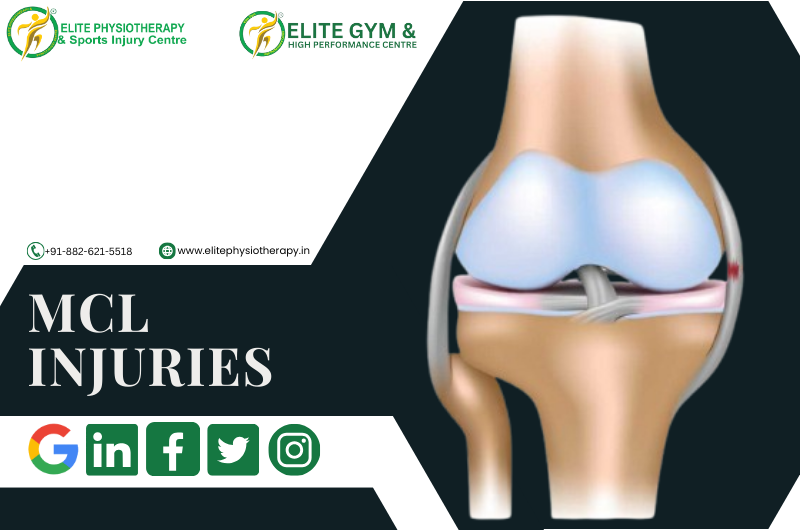Our specialty at Elite Physiotherapy and Sports Injury Centre offers evidence-based care to athletes and active people. Among the most frequent knee injuries we treat are medial collateral ligament (MCL) injuries, which frequently arise during sports or other physical activity involving abrupt twisting or impact. This article provides a thorough analysis of MCL injuries, including the causes, diagnostic techniques, and the physiotherapy management procedures we employ to guarantee the best possible outcome.
What is the MCL, and How is it Injured?
On the inside of the knee is a thick, wide ligament called the MCL. It stabilizes the knee against valgus stresses, or inward bending, and joins the femur to the tibia. Usually, MCL injuries are brought on by:
- Direct Impact: When playing Hockey or football, a strike to the outside of the knee occurs.
- Abrupt Twisting Motions: Like in skiing or basketball.
- Overuse: When jogging or cycling, the knee joint experiences repeated stress.
Mechanism of Injury: One common on-field situation that results in MCL tears is when a Football player collides with another player and receives a lateral hit to the knee, causing it to bend inward.
Signs and Symptoms
- The inside of the knee is tender and painful.
- Bruising and swelling near the joint.
- A sensation of looseness or instability in the knee.
- Inability to fully bend or straighten the leg.
- Unable to support weight on the injured leg under extreme situations.
Diagnostic Methods of MCL Injuries at Elite Physiotherapy
We use a thorough assessment procedure that consists of:
- Medical History and Physical Examination: Evaluation of pain, swelling, and valgus instability.
- Special Physiotherapy Tests: To identify MCL involvement, some tests, such as the Valgus Stress Test, are conducted at 0° and 30° flexion.
- Functional Mobility Analysis: Assessing knee function during weight-bearing and dynamic motions to spot deficiencies is known as functional mobility analysis.
- Advanced Imaging (if required): The diagnosis can be verified by working with radiologists to do an MRI or ultrasound.
Comprehensive Physiotherapy Treatment for MCL Injuries at Elite Physiotherapy
Medial Collateral Ligament (MCL) injuries require a systematic, grade-specific treatment approach. Here’s a detailed plan:
1. Phase Acute (First 0–2 Weeks)
Goals:
- Reduce swelling and pain.
- Keep the injured ligament safe.
Interventions:
- Cryotherapy: To reduce inflammation, apply cold packs.
- Immobilization: To stabilize the joint, use a hinged knee brace.
- Electrotherapy: Pain is lessened by methods including high-intensity laser therapy and TENS.
- Gentle ROM Exercises: To preserve knee mobility without putting undue strain on the ligament, engage in passive and active-assisted activities.
2. Subacute Phase (2–6 Weeks)
Goals:
- Restore muscular activation and range of motion.
- Start to improve your proprioception and strength.
Interventions:
- Stretching: Pay attention to your calf, quadriceps, and hamstrings.
- Isometric Exercises: Work your quadriceps and hamstrings to keep your muscles toned without moving your knees.
- Proprioception Training: Retrain your balance by using stability aids like wobble boards.
- Exercises for the Closed Kinetic Chain: Begin with step-ups and mini-squats as tolerated.
- Manual therapy: Joint alignment is improved by methods such as patellar mobilization.
3. Rehabilitation Phase (6–12 Weeks)
Objectives:
- Develop dynamic stability and strength.
- Enhance your functional ability.
Interventions:
- Incorporate single-leg exercises, resisted lateral walks, and leg presses into your strength training regimen.
- Dynamic Exercises: Advance to step-downs, lunges, and sideways motions.
- Neuromuscular Drills: Cutting maneuvers and agility ladders.
- Plyometrics: To improve power and athletic preparedness, use controlled hops and jumps.
- Soft Tissue Release: Use myofascial release techniques to relax tense muscles.
4. Advanced Functional Training (12+ Weeks)
Goals:
- Become prepared for your sport.
- Prevent re-injury.
Interventions:
- Speed and Agility Work: Exercises emphasizing rapid direction changes.
- Sport-Specific Exercises: To regain confidence, mimic game actions.
- Progressive Load Management: Boost training volume gradually.
- Functional Testing: To ascertain whether a player is ready to resume play, use strength tests, balance tests, and hop tests.
- Instruction in Injury Prevention: Provide instruction in appropriate biomechanics, warm-up techniques, and strength-maintenance methods.
Why Choose Elite Physiotherapy for MCL Injuries?
- Modern Equipment: We include cutting-edge technology in our care, from high-intensity laser therapy to cryotherapy.
- Holistic Approach: Integrating health and nutrition plans with physical therapy to promote a full recovery.
- Personalized Care: Every rehabilitation program is customized to the goals, sport, and lifestyle of the individual.
Our goal at Elite Physiotherapy and Sports ailment Centre is to ensure each patient recovers from their injury and regains their strength and self-assurance. To begin your road to recovery if you have an MCL injury, schedule a consultation right now.

